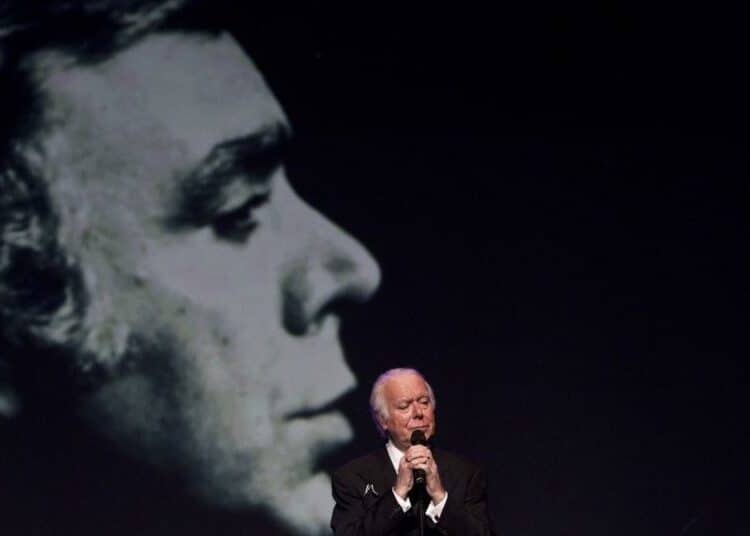He was responsible for the modernization of the musical genre by transforming this genre of Lisbon urban folklore into a happy and modern song.
Carlos do Carmo, the singer of fado, the most popular musical genre in Portugal , died this Friday in Lisbon at the age of 81, due to an aneurysm. “We Portuguese are in mourning,” said the President of the Republic, Marcelo Rebelo de Sousa, who has decreed a day of mourning and posthumously decorated him with the Medal of Freedom for his contribution to national culture.
The artist had experienced various health problems in the last two decades, and had even had a first aneurysm at age 60, which led him to the operating room three times. “Until he was 50 he was a locomotive. But then I fell off a stage in Bordeaux (France) and it was very bad. I was never the same man again. Then at 60, I had the aneurysm. I was dying with all three operations. Then I had tuberculosis and recently I had heart problems again, ”he told the newspaper Diário de Noticias in February 2008.
Carlos do Carmo is considered by critics as the refounder of Fado, a musical genre of urban folklore from Lisbon that has become popular in the world, a national symbol and considered by UNESCO as Intangible Cultural Heritage of Humanity, an award to which the now deceased singer contributed a lot.
With the arrival of democracy in 1974, Carlos, as he was popularly known, gave a boost to his career and transformed the musical genre into a happy and vibrant song in the face of the fatalistic and sad nuance that characterized it until then. With this he managed to captivate a young audience and open the doors to the new generation of young singers and composers who revolutionized the genre.
The “fadista” offered the last concert of his career on November 9, 2019, in Lisbon. That day he received the key to his city. When announcing the end of his career, nine months earlier, he confessed that he did not have the ability of others to continue singing. “It is the year that I will be 80 years old. 80 years is an age. It will be the year of farewell, without bitterness, without acidity, “he said in a television interview.
“I took this path of mine that was not made of stones, but that I always consider a healthy path and that always led me to have a perspective of being in solidarity with my colleagues. I don’t recall being wrong with a professional colleague. And, for this new generation, I am with open arms ”.
He added: “I always raced on my own track and not on a competition track, I never competed, because singing is not the same as running. There are always tastes. Some like it better, others like B. That does not mean that A or B sing very well or sing badly, they are the people’s tastes ”, he added.
Born in Lisbon on December 21, 1939, Carlos Manuel de Ascensão do Carmo de Almeida was the son of the fado singer Lucília do Carmo, a “monster” of song, and of the bookseller Alfredo Almeida, owners of a restaurant where Carlos began singing in 1964 and built a career of more than 50 years, during which he was recognized in 2014 with a Latin Grammy, and the award for Personality of the Year from the Association of Foreign Press of Portugal.
Carlos sang on the main stages of the world, from the Olympia, in Paris, to the Frankfurt Opera, from the ‘Canecão’, in Rio de Janeiro, to the Royal Albert Hall, in London, and the Karl Marx Theater, in Havana .
In 2015 he received the «Grande Médaille de Vermeil» of the city of Paris, “the highest distinction” of the French capital, and, a year later, he was awarded the title of Grand Officer of the Order of Merit, of the Presidency of the Republic of your country. The Encyclopedia of Portuguese Music of the 20th Century points to Carlos do Carmo as “one of the greatest references” of fado, only surpassed by the legendary Amalia Rodrigues .
“The transformations that Carlos do Carmo carried out [in fado] were influenced by his musical tastes that included external references” such as Bossa Nova, from Brazil, and the styles of singers such as Frank Sinatra (1915-1998), Jacques Brel (1929 -1978) and Elis Regina (1945-1982), according to the encyclopedia of Portuguese music.
The encyclopedia also highlights that, since the 1970s, “he accentuated musical innovations”, becoming the highest representative of the so-called ‘new fado’, with works such as the album “Um Homem na Cidade” (1977). He was one of the main and most decisive ambassadors for the Fado Candidacy for the Intangible Cultural Heritage of Humanity, and played a “fundamental role in the dissemination of the greatest Portuguese poets”, as highlighted by the jury of the Graça Moura Basque Citizenship Award Cultural.
In the interview with the Diário de Noticias , Carlos do Carmo said that he hoped to be remembered as a person devoted to fado “as a cause.”
“There is one thing that is certain and certain: in my generation, which has good fado singers, I hope to remain as a person who gave himself to fado as a cause. I am the son of one of the greatest fado singers in the history of fado, who is recognized by those who know the subject… ”, he said.

